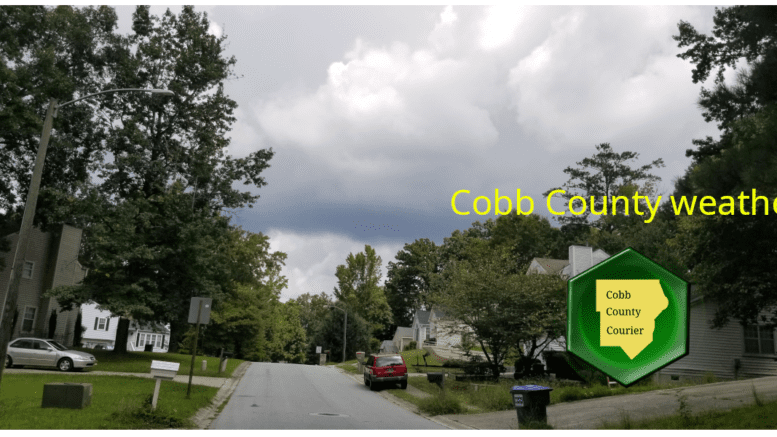The National Weather Service forecasts mostly cloudy skies here in Cobb County on Tuesday, January 16, 2024.
The National Weather Service has issued a hazardous weather outlook for Cobb County and other parts of the region due to a mix of snow, sleet, freezing rain, and rain that will continue across portions of north and west Georgia early this morning. A winter weather advisory is in effect until noon and a wind chill advisory will be in effect from 5 p.m. this afternoon until 10 a.m. Wednesday.
What does the extended forecast have in store?
Tuesday
Freezing rain and sleet likely before 8 a.m, then a slight chance of snow between 8 a.m and 9 a.m. Mostly cloudy, with a temperature falling to around 24 by 10 a.m. Northwest wind around 15 mph, with gusts as high as 30 mph. Chance of precipitation is 60 percent. Little or no ice accumulation expected. Little or no snow and sleet accumulation expected.
Tuesday Night
Mostly clear, with a low around 13. Northwest wind 10 to 15 mph, with gusts as high as 25 mph.
Wednesday
Sunny, with a high near 36. Northwest wind 5 to 10 mph.
Wednesday Night
Mostly clear, with a low around 20. West wind around 5 mph becoming calm.
Thursday
Mostly sunny, with a high near 48.
Thursday Night
Rain likely. Mostly cloudy, with a low around 35. Chance of precipitation is 70 percent.
Friday
Partly sunny, with a high near 39.
Friday Night
Mostly clear, with a low around 13.
Saturday
Sunny, with a high near 29.
Saturday Night
Mostly clear, with a low around 15.
Sunday
Sunny, with a high near 40.
Sunday Night
Partly cloudy, with a low around 24.
Monday
Mostly sunny, with a high near 47.
What was the climate like in the latest reporting period?
The NWS climate summary for metro Atlanta has now been updated with December 2023 figures.
In an article entitled What is the Difference between Climate and Weather?, the National Ocean Service describes the difference as follows:
“Weather is what you see outside on any particular day. So, for example, it may be 75° degrees and sunny or it could be 20° degrees with heavy snow. That’s the weather.
“Climate is the average of that weather. For example, you can expect snow in the Northeast in January or for it to be hot and humid in the Southeast in July. This is climate. The climate record also includes extreme values such as record high temperatures or record amounts of rainfall. If you’ve ever heard your local weather person say “today we hit a record high for this day,” she is talking about climate records.
“So when we are talking about climate change, we are talking about changes in long-term averages of daily weather. In most places, weather can change from minute-to-minute, hour-to-hour, day-to-day, and season-to-season. Climate, however, is the average of weather over time and space.”
The climate report for the Atlanta area for the previous month shows how much departure from the average temperatures that month represents. The average temperature for a date is the average over a 30-year period.
| Date | High | Low | Average | Departure from norm | Precipitation |
| 2023-12-01 | 66 | 47 | 56.5 | 6.5 | 0.15 |
| 2023-12-02 | 67 | 58 | 62.5 | 12.7 | T |
| 2023-12-03 | 69 | 52 | 60.5 | 10.9 | 0.1 |
| 2023-12-04 | 69 | 45 | 57 | 7.6 | 0 |
| 2023-12-05 | 61 | 40 | 50.5 | 1.3 | 0 |
| 2023-12-06 | 54 | 39 | 46.5 | -2.5 | 0 |
| 2023-12-07 | 59 | 32 | 45.5 | -3.3 | 0 |
| 2023-12-08 | 63 | 37 | 50 | 1.4 | 0 |
| 2023-12-09 | 69 | 52 | 60.5 | 12.1 | 0.28 |
| 2023-12-10 | 65 | 38 | 51.5 | 3.3 | 1.16 |
| 2023-12-11 | 51 | 33 | 42 | -6 | 0 |
| 2023-12-12 | 56 | 33 | 44.5 | -3.3 | 0 |
| 2023-12-13 | 59 | 35 | 47 | -0.7 | 0 |
| 2023-12-14 | 59 | 42 | 50.5 | 3 | 0 |
| 2023-12-15 | 60 | 35 | 47.5 | 0.2 | 0 |
| 2023-12-16 | 58 | 41 | 49.5 | 2.4 | T |
| 2023-12-17 | 54 | 48 | 51 | 4 | 0.01 |
| 2023-12-18 | 58 | 37 | 47.5 | 0.7 | 0 |
| 2023-12-19 | 47 | 29 | 38 | -8.7 | 0 |
| 2023-12-20 | 53 | 29 | 41 | -5.5 | 0 |
| 2023-12-21 | 57 | 32 | 44.5 | -1.9 | 0 |
| 2023-12-22 | 58 | 40 | 49 | 2.8 | 0 |
| 2023-12-23 | 67 | 44 | 55.5 | 9.4 | 0 |
| 2023-12-24 | 65 | 46 | 55.5 | 9.5 | 0.01 |
| 2023-12-25 | 63 | 57 | 60 | 14.2 | 1.7 |
| 2023-12-26 | 63 | 53 | 58 | 12.3 | 0.27 |
| 2023-12-27 | 58 | 47 | 52.5 | 6.9 | T |
| 2023-12-28 | 56 | 39 | 47.5 | 2 | 0 |
| 2023-12-29 | 45 | 34 | 39.5 | -5.9 | T |
| 2023-12-30 | 49 | 34 | 41.5 | -3.7 | 0 |
| 2023-12-31 | 57 | 31 | 44 | -1.2 | 0 |
Climate Almanac for metro Atlanta
This almanac provides information on past climate conditions for today’s date, January 16, allowing a comparison to current weather.
Simply put, it helps you see what the weather would typically be like on this day, according to historical data.
| Daily Data | Observed | Normal | Record Highest | Record Lowest |
| Max Temperature | M | 54 | 73 in 1882 | 28 in 1972 |
| Min Temperature | M | 35 | 64 in 1882 | 5 in 1972 |
| Avg Temperature | M | 44.5 | 68.5 in 1882 | 16.5 in 1972 |
| Precipitation | M | 0.15 | 2.35 in 1925 | 0.00 in 2023 |
| Snowfall | M | 0.1 | 2.4 in 1965 | 0.0 in 2023 |
| Snow Depth | M | – | 2 in 1965 | 0 in 2023 |
| HDD (base 65) | M | 20 | 48 in 1972 | 0 in 1907 |
| CDD (base 65) | M | 0 | 4 in 1882 | 0 in 2023 |
| Month-to-Date Summary | Observed | Normal | Record Highest | Record Lowest |
| Avg Max Temperature | 53.5 | 53.6 | 65.5 in 1907 | 36.9 in 1912 |
| Avg Min Temperature | 35.1 | 35.7 | 51.3 in 1907 | 22.1 in 2010 |
| Avg Temperature | 44.3 | 44.7 | 58.4 in 1907 | 29.9 in 1918 |
| Total Precipitation | 4.31 | 2.37 | 7.57 in 1883 | 0.00 in 1902 |
| Total Snowfall | 0.0 | 0.6 | 7.0 in 1982 | 0.0 in 2024 |
| Max Snow Depth | 0 | – | 3 in 2011 | 0 in 2024 |
| Total HDD (base 65) | 307 | 326 | 558 in 1918 | 95 in 1907 |
| Total CDD (base 65) | 0 | 0 | 8 in 2022 | 0 in 2024 |
| Year-to-Date Summary | Observed | Normal | Record Highest | Record Lowest |
| Avg Max Temperature | 53.5 | 53.6 | 65.5 in 1907 | 36.9 in 1912 |
| Avg Min Temperature | 35.1 | 35.7 | 51.3 in 1907 | 22.1 in 2010 |
| Avg Temperature | 44.3 | 44.7 | 58.4 in 1907 | 29.9 in 1918 |
| Total Precipitation | 4.31 | 2.37 | 7.57 in 1883 | 0.00 in 1902 |
| Total Snowfall (since July 1) | 0.0 | 1.0 | 7.0 in 1982 | 0.0 in 2024 |
| Max Snow Depth (since July 1) | 0 | – | 3 in 2011 | 0 in 2024 |
| Total HDD (since July 1) | 1104 | 1316 | 2224 in 1977 | 902 in 2016 |
| Total CDD (since Jan 1) | 0 | 0 | 8 in 2022 | 0 in 2024 |
Period of Record:
- Max Temperature : 1878-10-04 to 2024-01-15
- Min Temperature : 1878-10-04 to 2024-01-15
- Precipitation : 1878-10-01 to 2024-01-15
- Snowfall : 1928-12-25 to 2024-01-15
- Snow Depth : 1928-12-25 to 2024-01-15
For much more information on the climate in our area, visit the NWS Climate FAQ for the Atlanta area.
What does the National Weather Service do?
The National Weather Service (NWS) is a part of the National Oceanic and Atmospheric Administration (NOAA).
The NWS describes its role as follows:
“The National Weather Service (NWS) provides weather, water, and climate forecasts and warnings for the United States, its territories, adjacent waters and ocean areas, for the protection of life and property and the enhancement of the national economy.
“These services include Forecasts and Observations, Warnings, Impact-based Decision Support Services, and Education in an effort to build a Weather-Ready Nation. The ultimate goal is to have a society that is prepared for and responds to weather, water and climate events.”



